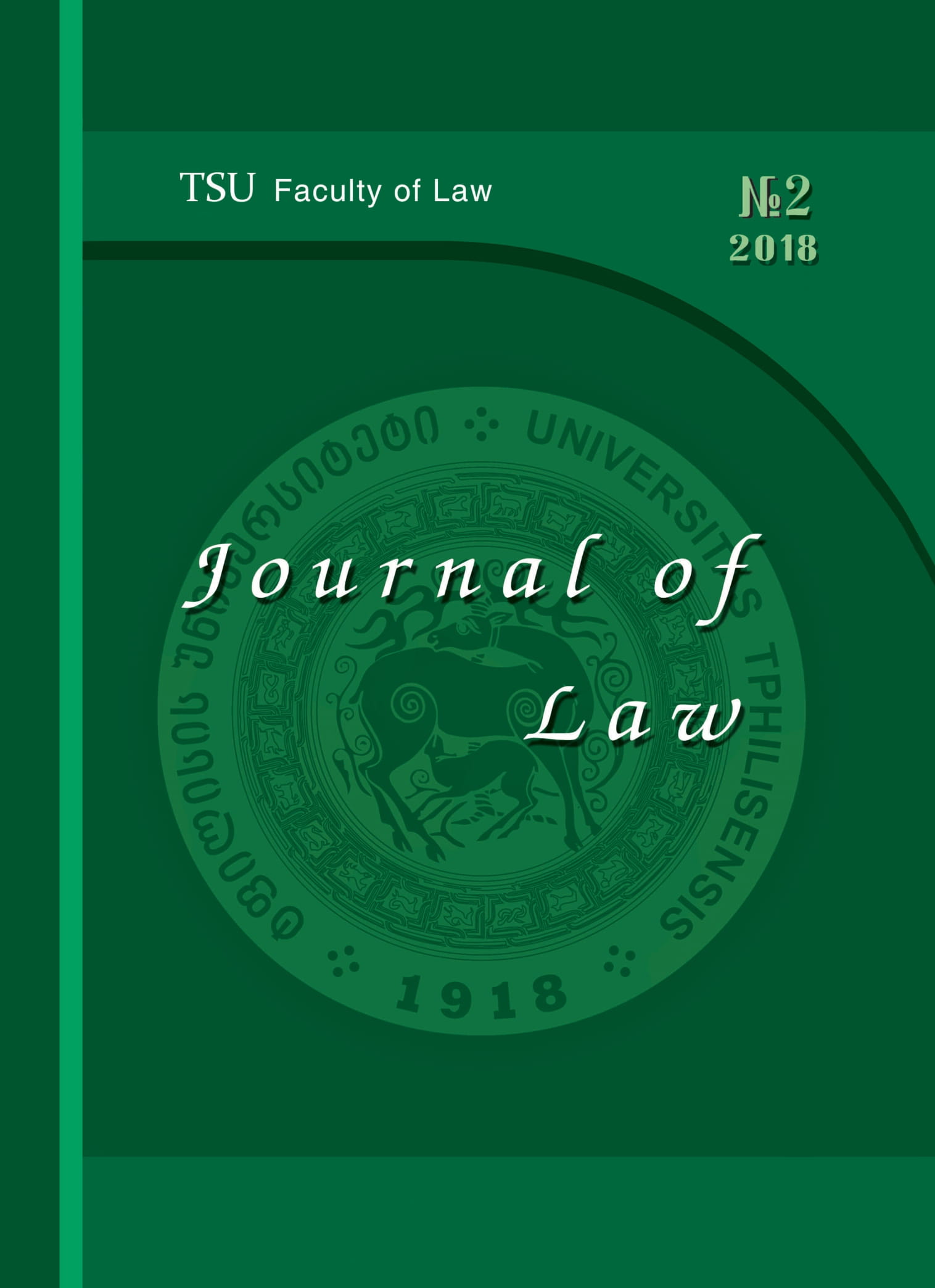Consideration of Competence Disputes in the Constitutional Court, as the Principal Constitutional Mechanism for the Realization of Power Division Principle
Keywords:
Constitutional Court, principle of power separation, competent disputes, constitutional justice.Abstract
The idea of the Constitutional Court is essentially linked to the constitutional control of the state authorities power. In the Constitutional judicial history, one of the most important precedents (Marbury vs. Madison) happened in the United States Constitutional Justice and it was particularly about the crisis of power division between state authorities. Therefore, at the modern development stage of the constitutionalism, it is important to evaluate the role and significance of the Constitutional Court's competence regarding the competent disputes. It is also necessary to evaluate the European experience in this direction and those important and interesting consequences for the constitutional control and constitutional justice within such competence. Consequently, within the framework of this key instrument of constitutional control, we should talk about the primacy of the law, within that the idea of constitutionalism should be developed. This issue has a doctrinal importance and at the same time has a special significance for the development of Georgian constitutionalism.
References
Constitution of Georgia, Departments of the Parliament of Georgia, 31-33, 24/08/1995.
Organic Law of Georgia on the Constitutional Court of Georgia, Departments of the Parliament of Georgia, 001, 27/02/1996.
Alasania G., The Scope of the Executive Government of the President of Georgia with the Constitution of Georgia, Seminar Paper, Tbilisi, 2008, 23 (in Georgian).
Bezhuashvili G., The Role of Modern International Law in Implementation of Georgia's Foreign Policy, Georgia and International Law, Korkelia K., Sesiashvili I. (eds.), Tbilisi, 2001, 27 (in Georgian).
Bezhuashvili G., Constitutional Legal Basis of the Foreign Policy of Georgia, Journal “Man and Constitu-tion”, № 3, Tbilisi, 2001, 57 (in Georgian).
Council on Foreign Relations, Balance of U.S. War Powers, 2013, http://www.cfr.org/united-states/balan-ce-war-powers-us-president-congress/p13092.
David R., Modern Legal Systems of Modernity, Ninidze T., Sumbatasgvili E. (trans.), Ninidze T. (ed.), Tbilisi, 1993, 125 (in Georgian).
Erkvania T., Normative Constitutional Claim as an Imperfect Form of Concrete Constitutional Control in Georgia, 2014, https://emc.org.ge/ka/products/normatiuli-sakonstitutsio-sarcheli-rogorts-konkretuli-sakon-sti¬tutsio-kon¬trolis-arasrulqofili-forma-sakartveloshi (in Georgian).
Elgie R., The Politics of Semi-Presidentialism, 1999, http://www.resear¬chgate.net/publica¬tion/26510¬1267_-The_Politics_of_Semi-Presidentialism.
Getsadze G., Constitutional Justice and Politics?! (On the example of the Federal Republic of Germany), “Georgian Law Review”, 1st 2nd Quarter, Tbilisi, 1999, 74, 75, 81, 82 (in Georgian).
Ipsen J., Statrecht, München, 1996, 245.
Kakhiani G., Institute of Constitutional Control and its Problems in Georgia: Analysis of Law and Practice, Tbilisi, 2008, 22, 24, 32-33, 147, 197, 237 (in Georgian).
Kverenchkhiladze G., Constitutional Status of the Government of Georgia (Comment on Article 78 of the Constitution), Contemporary Constitutional Law, Kverenchkhiladze G., Gegenava D. (eds.), Book I, Tbilisi, 2012, 8-9, 19 (in Georgian).
Khubua G., Constitutional Court Justice and Policy, Journal “Review of the Constitutional Law”, № 9, 2016, 5, 8 (in Georgian).
Liberali, What is the meaning of the Liberal, who will sign the Association Agreement with the European Union?, 2014, http://liberali.ge/blogs/view/5903/ra-mnishvneloba-aqvs-vin-moatsers-khels-evrokavshi¬r¬tan¬-asotsirebis-shetankhmebas(in Georgian).
Marinashvili M., Gelashvili N., Place of the Decision of the Constitutional Court in the System of Justice, Journal “Justice”, № 3, 2007, 167-170 (in Georgian).
Menabde V., Who should Sign the Association Agreement?, “Liberali”, 2014, http://libe¬rali.¬ge/blogs/-view/5889/vin-unda-moatseros-kheli-asotsirebis-khelshekrulebas (in Georgian).
McQuire K. A., President ― Prime Minister Relations, Party System, and Democratic Stability in Semiprezidental Regimes, Comparing the French and Russian Models, Texas International Law Journal, Vol. 47(2), 2012, 429.
Nakashidze M., Peculiarities of Presidential Relations with Government Departments in Semi-Presidential Systems of Management, Tbilisi, 2010, 210, 226 (in Georgian).
Protsyk O., Intra-Executive Competition between President and Prime Minister: Patterns of Institutional Conflict and Cooperation under Semi-prezidentalism, Politik Studies, Vol. 54, 2006, 222.
Papuashvili G., 1921 Constitution of the Democratic Republic of Georgia (from the perspective of 90 years), 2nd ed., Batumi, 2013, 24 (in Georgian).
Schwartz H., Establishing Constitutional Justice in Post-communist Europe, Aleksidze K. (trans.), Tbilisi, 2003, 112, 114, 117, 119, 120, 149, 415 (in Georgian).
Shayo A., The Restriction of the Authorities (Introduction to Constitutionalism), Maisuradze M. (trans.), Ninidze T. (ed.), Tbilisi, 2003, 45, 92-93, 283 (in Georgian).
Sedelius T., Mashtaler O., Two Decades of Semi-presidentialism: Issues of Intra-executive Conflict in Central and Eastern Europe 1991-2011, East European Politics, № 29:2, 2013, 115.
Transparency International — Georgia, The Association Agreement with European Union should be signed by the President of Georgia, 2014, https://www.transparency.ge/ge/blog/evrokavshirtan-asotsirebis-she¬tankhmebas-kheli-sakartvelos-prezidentma-unda-moatseros (in Georgian).
Wesel U., Die Zweite Kreise, Zeit № 40, September, 1995.
Marbury v. Madison, 5 U.S. 137 (1803).
Myers v. United States, 272 US 293 (1926).
An Introductory Record of Plenum of the Constitutional Court of Georgia, № 3/6/668 of 12 October 2015.
Moldovan citizen Mariana Kiku against the Parliament of Georgia, Judgment of the Constitutional Court of Georgia of 14 December 2012, № 1/5/525.
A citizen of Austria Matthias Huter against the Parliament of Georgia, Judgment of the Constitutional Court of Georgia of 24 June 2014, № 1/2/563.
Decision of the Constitutional Court of Georgia of 25 May 2004, № 15/290, 266.
Decision of the Constitutional Court of Georgia of 29 January 1998, № 1/1/72-73.
Decision of Constitutional Court of Georgia of 10 April 1998, № 2/53/1.
Decision of Constitutional Court of Georgia of 9 November 1999, № 1/7/87.
Decision of Constitutional Court of Georgia of 13 June 2000, № 3/122, 128.
Decisions of Constitutional Court of Georgia of 30 March 2001, № 6134-139-140.
Decision of Supreme Court of Georgia of 22 May 2003, № 3d-as-44k-s-03, Decisions of the Supreme Court of Georgia on Administrative and other Categories of Cases, Jorbenadze S. (ed.), № 7, Tbilisi, 2003, 1769-1773.
Constitutional Court of Georgia, http://constcourt.ge/album/stat/9.gif.
Downloads
Published
How to Cite
Issue
Section
License
Copyright (c) 2019 TSU Publishing House

This work is licensed under a Creative Commons Attribution-ShareAlike 4.0 International License.








